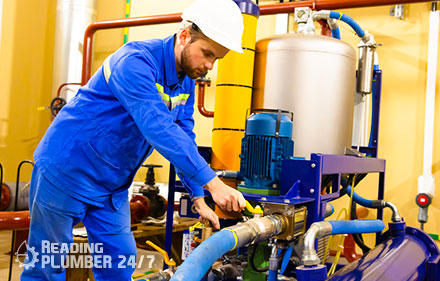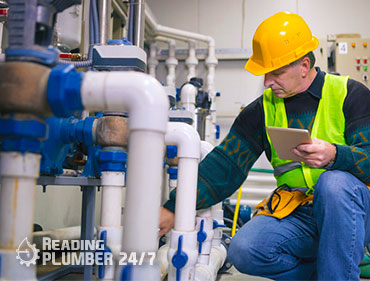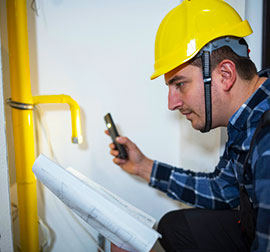

A gas safe engineer Reading is a person who has passed a government-accredited exam and has the required experience in order to be issued with a license and practice the trade of the plumbing and gas fitting industries.
The Gas safe register is a register of people who perform gas work in the United Kingdom. It was introduced by the Gas Safety (Installation and Use) Regulations 1998 (under the Health and Safety at Work etc. Act 1974). It is administered by OFGEM on behalf of the Health and Safety Executive.
Table of Contents
How to Register as a Gas Engineer Reading?
The register is a list of individuals who are competent to carry out gas work in accordance with the regulations, and who have registered with OFGEM.
Those who work for companies/organizations that provide gas work to the public must be on the Register. The only exception is those who only carry out domestic gas fitting, i.e. private dwellings (i.e., not commercial properties) or non-domestic premises that are used for private purposes only – for example, domestic garages or garden sheds. Those working on their own must hold an appropriate qualification and be entered on the Register as self-employed or as an individual proprietor; they must also be registered with HM Revenue and Customs as self-employed where applicable.
To qualify for registration all applicants must take a course of training, which includes 35 hours of classroom based learning, followed by an assessment centre and finally a practical test which tests both practical knowledge and competence.
Commercial Gas Engineers Reading Responsibilities
Commercial gas engineers Reading are responsible for maintaining the comfort and safety of commercial premises by installing and maintaining the boiler systems, hot water systems, heating engineers systems, air conditioning, ventilation systems, refrigeration systems and any other equipment required to make a building comfortable for its inhabitants.
‘Commercial gas engineer Reading’ is a term used in the UK, Australia and other Commonwealth countries. In some parts of the world, these workers are known as engineers or technicians rather than engineers and technicians. This is not to be confused with an ‘industrial gas engineer’, who specialize in the use of gas as a fuel in industrial applications.
Commercial gas engineers Reading often work with other tradespeople, such as architects or building managers. Commercial gas engineers are employed by companies which service larger commercial properties or contracted directly by individual businesses. They may work alone or with a small team of other specialists (such as refrigeration mechanics) depending on the size and needs of the project.
It is very important to choose the right LPG gas engineer Reading. Before hiring a LPG gas engineer, you should check for their experience, training, and references. It is also important that the LPG gas engineer you hire is familiar with the codes and standards that apply to your project.
Tasks of a LPG Gas Engineer Reading
A LPG Gas Engineer installs, maintains, and repairs all types of liquefied petroleum gas equipment that are used in the home or commercial environment.
The LPG Gas Engineer Reading should have knowledge of:
- LPG storage tanks
- Gas piping systems
- Safety valves
- Gas regulators
- Pressure gauges
- Temperature gauges
- Gas burners and other gas appliances
These are just some examples of the equipment that a LPG Gas Engineer may encounter during their work. It is important that the LPG Gas Engineer has knowledge of all the equipment listed above because they may need to make adjustments or repairs at any time. With this being said it is imperative that an employer checks references before hiring a LPG Gas Engineer because this will greatly reduce chances of hiring someone who is not qualified for the job.
A gas safe engineer Reading is a person who has passed a government-accredited exam and has the required experience in order to be issued with a license and practice the trade of the plumbing and gas fitting industries.
The Gas safe register is a register of people who perform gas work in the United Kingdom. It was introduced by the Gas Safety (Installation and Use) Regulations 1998 (under the Health and Safety at Work etc. Act 1974). It is administered by OFGEM on behalf of the Health and Safety Executive.
How to Register as a Gas Engineer Reading?
The register is a list of individuals who are competent to carry out gas work in accordance with the regulations, and who have registered with OFGEM.
Those who work for companies/organizations that provide gas work to the public must be on the Register. The only exception is those who only carry out domestic gas fitting, i.e. private dwellings (i.e., not commercial properties) or non-domestic premises that are used for private purposes only – for example, domestic garages or garden sheds. Those working on their own must hold an appropriate qualification and be entered on the Register as self-employed or as an individual proprietor; they must also be registered with HM Revenue and Customs as self-employed where applicable.
To qualify for registration all applicants must take a course of training, which includes 35 hours of classroom based learning, followed by an assessment centre and finally a practical test which tests both practical knowledge and competence.
Commercial Gas Engineers Reading Responsibilities
Commercial gas engineers Reading are responsible for maintaining the comfort and safety of commercial premises by installing and maintaining the boiler systems, hot water systems, heating systems, air conditioning, ventilation systems, refrigeration systems and any other equipment required to make a building comfortable for its inhabitants.
‘Commercial gas engineer Reading’ is a term used in the UK, Australia and other Commonwealth countries. In some parts of the world, these workers are known as engineers or technicians rather than engineers and technicians. This is not to be confused with an ‘industrial gas engineer’, who specialize in the use of gas as a fuel in industrial applications.
Commercial gas engineers Reading often work with other tradespeople, such as architects or building managers. Commercial gas engineers are employed by companies which service larger commercial properties or contracted directly by individual businesses. They may work alone or with a small team of other specialists (such as refrigeration mechanics) depending on the size and needs of the project.
It is very important to choose the right LPG gas engineer Reading. Before hiring a LPG gas engineer, you should check for their experience, training, and references. It is also important that the LPG gas engineer you hire is familiar with the codes and standards that apply to your project.
Tasks of a LPG Gas Engineer Reading
A LPG Gas Engineer installs, maintains, and repairs all types of liquefied petroleum gas equipment that are used in the home or commercial environment.
The LPG Gas Engineer Reading should have knowledge of:
- LPG storage tanks
- Gas piping systems
- Safety valves
- Gas regulators
- Pressure gauges
- Temperature gauges
- Gas burners and other gas appliances
These are just some examples of the equipment that a LPG Gas Engineer may encounter during their work. It is important that the LPG Gas Engineer has knowledge of all the equipment listed above because they may need to make adjustments or repairs at any time. With this being said it is imperative that an employer checks references before hiring a LPG Gas Engineer because this will greatly reduce chances of hiring someone who is not qualified for the job.

If you need the Reading Plumber that can solve all your plumbing operations quickly and affordably, you can reach our 24/7 services from our phone numbers. After you contact us, our nearest Gas Safe Engineers Reading will assist you for the most appropriate solution.
Frequently Asked Questions About Gas Safe Engineers Reading
What is a gas engineer Reading?
A gas engineer Reading is someone who is qualified to work with and around gas. The role of the gas engineer is to ensure that all gas systems are safe, working correctly and efficiently, as well as stopping any hazards that may arise due to incorrect or missing installations. Gas engineers are required by law to ensure that the gas used within buildings is safe and works correctly.
Can one person do both the plumbing and gas work for an installation?
No, you must have either a qualified plumber or a qualified gas engineer Reading to do the work on your installation. Both trades have different available tests and qualifications which can be checked independently. For example, if you have a domestic boiler in your home, you would require a boiler service check every 12 months. If a plumber did this service, they would not be able to test the safety of the boiler in relation to the gas supply. This would need to be carried out by a qualified gas engineer who has passed specific tests in relation to domestic boilers.
How do I know if I need a gas engineer Reading?
You need a gas engineer Reading when you either move into a new property or carry out any work on your existing heating system. This applies even if there are no problems with the system at present.
Get A Free Estimate
We are more than happy to give advice on which solution is most suitable for your needs, depending on your Plumbing Serviecs. Why not ask us to view your property and discuss the various options with you now. Our advice is free!


